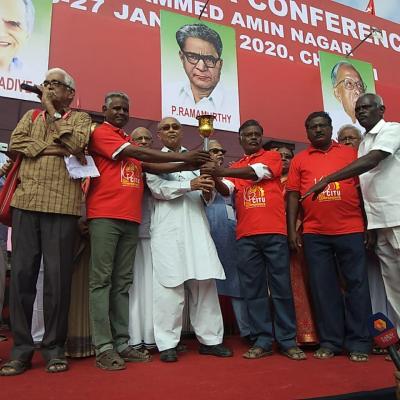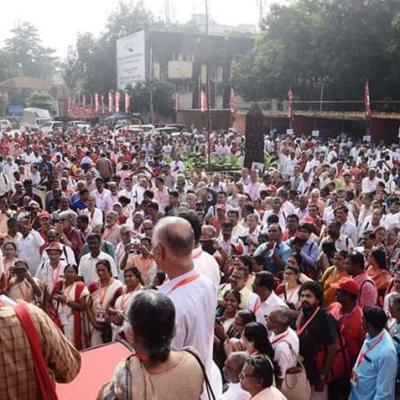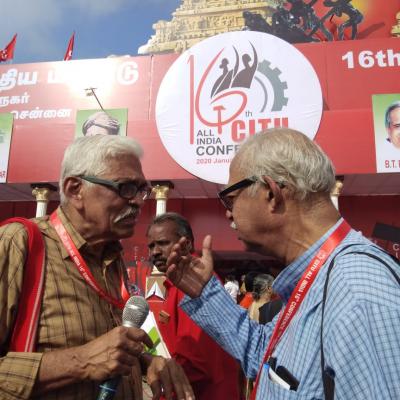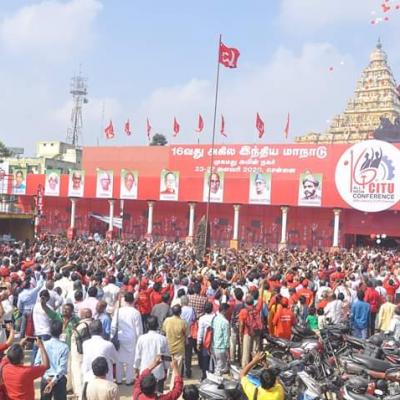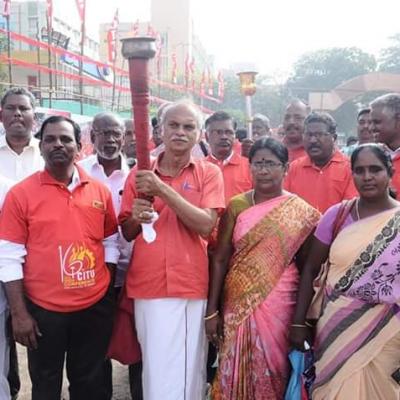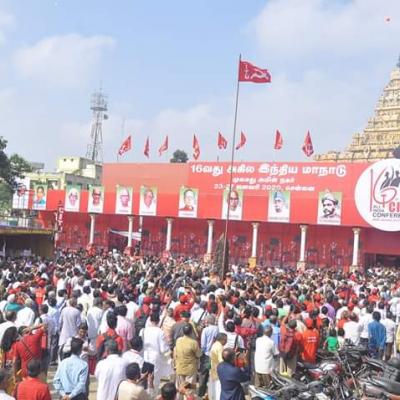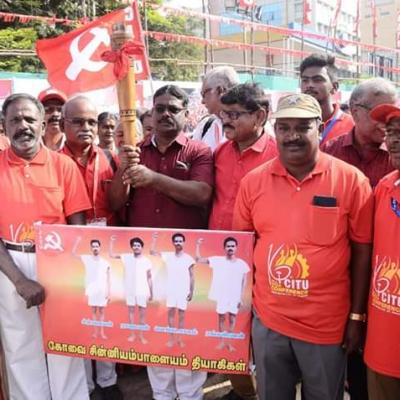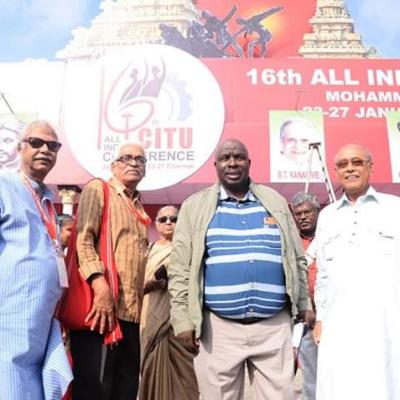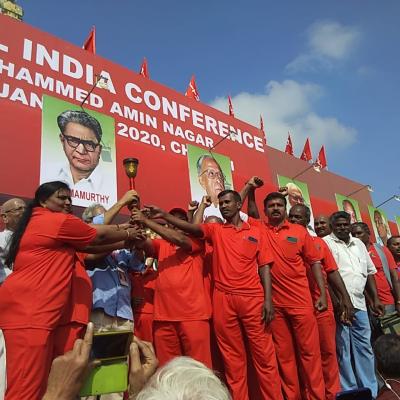THROUGH ITS PRESS RELEASE DATED 21 NOVEMBER 2025
REITERATES DEMAND FOR REPEAL OF ANTI-WORKER LABOUR CODES
The Centre of Indian Trade Unions (CITU) vehemently debunks the utterly deceptive claims made through the PIB Press Release (PRID 2192463) on the Four Labour Codes dated 21st November 2025. The press note of the Government of India attempts to portray these Codes as “pro-worker” and “modernizing,” while in reality they constitute the most sweeping and aggressive abrogation of workers’ hard-won rights and entitlements since Independence, aimed at facilitating corporate exploitation, contractualisation and unrestrained hire-and-fire.
CITU places below its point-wise response to the false claims propagated by the Government.
1. On the claim of “simplifying 29 laws into 4 Codes”!
The so-called simplification has been used as a cover to dilute, abolish and dismantle protective provisions of existing labour laws such as the Industrial Disputes Act, Factories Act, and Mines Act Contract Labour (Regulation and Abolition) Act etc. Rather than strengthening rights, the Codes dismantles job security, dilute the role of labour departments pushing it to negative direction, and push the entire workforce into precarious employment. With more than 90% workforce in unorganized sector, who will provide and guarantee the issuance of appointment letter?
2. On “Universal Social Security for all, including gig and platform workers”!
The Social Security Code does not guarantee universal coverage in any sense. Sections 109–114 merely talked about schemes for gig and platform workers, without mandatory timelines, defined benefits or allocations. The proposed aggregator contribution of 1–2% of turnover is too inadequate to fund pension, PF or health benefits; Aadhaar-based portability etc are all meaningless unless employment relations and employers’ obligation is ensured through statutory provisions and employment records and proper enforcement machinery - which are all absent in the Code. The social security code has not decreased the threshold number of employees in the EPF, ESI & Gratuity provisions from the existing threshold of 20 and 10 respectively and wage ceiling in the EPF & ESI for the coverage. But in the PIB statement it is deceptively claimed that all workers will get PF, ESIC, insurance and other social security benefits.
3. On “minimum wage coverage for all and a national floor wage”!
The Wage Code does not provide a scientific living wage as per 15th ILC norms and Supreme Court Judgment. An abysmally low national floor level wage, which too varied in different regions, will lead to forcing many states to reduce existing minimum wages. Moreover calling it “National Floor Level” is a substandard deceptive tactics since it differs from region to region as stated in the Wage Code. With weakened inspection and enforcement systems, over 45% of workers already earning below minimum wages (PLFS 2023) will continue to remain outside any meaningful protection. Moreover, a huge section of workforce like scheme workers is still outside the purview of this minimum wage.
4. On Preventive Health Care
Instead of extending the ESIC facilities to all the employees and ensuring health care facilities with the contribution of employers to ESIC without any threshold limit of workers and wage ceiling, the code talks of only statutory health check up after 40 years at the employers cost. It is another fraud on the employees and workers. For the coverage of establishments below 10, it is optional and voluntary for employers’ which most don’t do, and violation even in mandatory is rampant as seen presently.
5. On Timely wages !
The code on wages which has removed the existing provision of imposing fines up to 10 times even for the first time delay in payment of wages and illegal deduction, deceptively claims of ensuring timely wages which is a cruelty meted to the workers just to favour employers. Further the provisions of payment of wages which were applicable to MNREGA are now made non applicable through code on wages just to abdicate the Govt liability for timely payment of wages to the most vulnerable rural sections of workers. The central share of wages of millions of scheme workers is pending for months even as of now, but the govt claims of timely payment of wages to all through implementation of codes under which scheme workers are not covered.
6. On “fixed-term employment ensuring equal benefits”!
Fixed-term employment legalizes permanent temporariness in perennial and core jobs. Employers/corporate are endowed with unrestricted power to replace permanent jobs with short-term contracts. Gratuity after one year does not compensate for the loss of continuity of service, seniority, and actual benefits. This provision is aimed at destroying stable employment and weakening unionization.
7. On “equal opportunities and safer conditions for women workers”!
Allowing night shifts without enforceable safeguards and consent leads to coerced consent in a distressed labour market. The Codes do nothing to address the real problems faced by women workers, i.e., contractualisation, unequal pay, harassment, unsafe workplaces and denial of maternity benefits. Prohibitions on gender discrimination remain meaningless without strong enforcement, which the Codes dismantle completely.
8. On “improved protection for MSME, plantation, mine and construction workers”!
Self-certification and exemption mechanisms and above all increase in the threshold level for coverage, undermine rather negate the safety and labour standards in MSMEs leaving the labour totally unprotected. Construction Worker Welfare Funds continue to remain underutilized (besides promoting large-scale evasion of cess payment by employers - over ₹38,000 crores unspent (CAG 2022); and the Codes provide no mechanism for transparency or guaranteed payouts. The dilution of inspections in hazardous sectors like mining and plantations will worsen India’s already alarming workplace fatality rate.
9. On “strengthened, faster industrial dispute resolution”!
The Industrial Relations Code cripples the right to strike by imposing various conditions, for all sectors, banning strikes during and after conciliation and extending restrictions across all establishments. Raising the retrenchment, lay off and closure threshold to 300 workers for prior government permission enables hire-and-fire in more than 90% of the Indian workplaces. More than 12 lakh disputes are now pending for adjudication; average disposal period of disputes-adjudication is ranging from 3 to five years for more than 75% of the disputes. Implementation of Labour Codes will make the situation worst since the Govt, vide its Shrama Shakti Niti already put in public domain, has already confirmed the abdication of its mandatory responsibility of implementing labour laws by “repositioning itself from compliance of laws to role of a facilitator of employment”.
10. On “inspector-cum-facilitator improving transparency”!
Replacing independent inspectors with facilitators, and shifting to algorithm-based inspections, and dismantling complaint-based inspection are direct moves towards deregulation. Centralised Random inspections and compliance on self-certification will fuel violations of wages, safety norms, working hours and social security provisions. Workers lose an essential legal mechanism to fight exploitation.
11. On “labour flexibility creating more jobs and investment”!
The claim is absolutely fraudulent. There is no evidence, national or international, that diluting labour rights creates employment. Rajasthan’s labour law changes (2014–15), often cited by the Government, failed to increase jobs and instead accelerated contractualisation. India continues to face record unemployment and increasing informalisation, rather precarisation of employment relations even in formal sectors and consistent stagnation/decline in employment generating investment which cannot be denied by even official reports including from RBI. These Codes will worsen the crisis manifold by replacing secure jobs with disposable contract labour, apprentices/trainees and interns.
12. On “extensive stakeholder consultation”!
Indian Labour Conference (ILC), the highest tripartite official forum in the country has not been convened since last ten years despite consistent persuasion by the trade unions. All Central Trade Unions, including CITU, AITUC, INTUC, HMS, SEWA, AIUTUC, AICCTU, UTUC, TUCC and others, unanimously opposed the Codes in every consultation with concrete irrefutable arguments supported by documentary evidences. The Government ignored every major objection raised by trade unions. The Codes were pushed through Parliament without the opposition present, making a mockery of democratic procedure.
The four Labour Codes are an instrument of corporate-driven labour market deregulation, aimed at: destroying job security, suppressing the right to strike, dismantling labour inspection, expanding contractualisation and fixed-term employment, weakening unions and collective bargaining and limiting social security to token schemes - all aimed at a mad drive of minimization of labour cost and also dismantling of labour rights.
CITU demands the repeal of all four Labour Codes.
CITU calls upon the Working Class of India to join the united call of joint platform of central trade unions to combatively defy and resist such atrocious anti-people measures through militant united struggle both at sectoral and national level – asserting collectively the rights being attempted to be snatched away.
CITU salutes the workers for the immediate spontaneous protests, and urges its unions, workers across sectors, industries and regions to intensify united struggles, join broader joint trade union actions, and build powerful resistance to defend labour rights, social security and democratic freedoms - rise with full strength on 26 November 2025.
The working class of India has fought and defeated anti-worker policies before; it will do so again.
Issued by,
Tapan Sen
General Secretary













